牛津译林版初二英语unit5语法
牛津译林版八年级英语unit5知识点
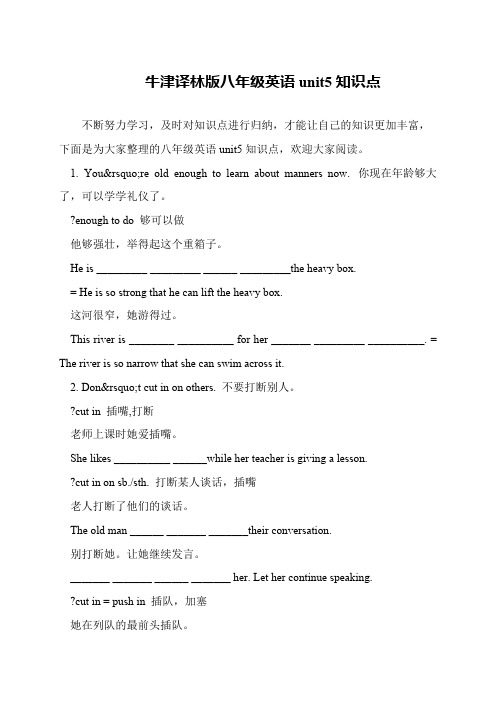
牛津译林版八年级英语unit5知识点不断努力学习,及时对知识点进行归纳,才能让自己的知识更加丰富,下面是为大家整理的八年级英语unit5知识点,欢迎大家阅读。
1. You’re old enough to learn about manners now. 你现在年龄够大了,可以学学礼仪了。
?enough to do 够可以做 他够强壮,举得起这个重箱子。
He is _________ _________ ______ _________the heavy box. = He is so strong that he can lift the heavy box. 这河很窄,她游得过。
This river is ________ __________ for her _______ _________ __________. = The river is so narrow that she can swim across it. 2. Don’t cut in on others. 不要打断别人。
?cut in 插嘴,打断 老师上课时她爱插嘴。
She likes __________ ______while her teacher is giving a lesson. ?cut in on sb./sth. 打断某人谈话,插嘴 老人打断了他们的谈话。
The old man ______ _______ _______their conversation. 别打断她。
让她继续发言。
_______ _______ ______ _______ her. Let her continue speaking. ?cut in = push in 插队,加塞 她在列队的最前头插队。
牛津译林版英语八年级英语上册 Unit5知识点梳理
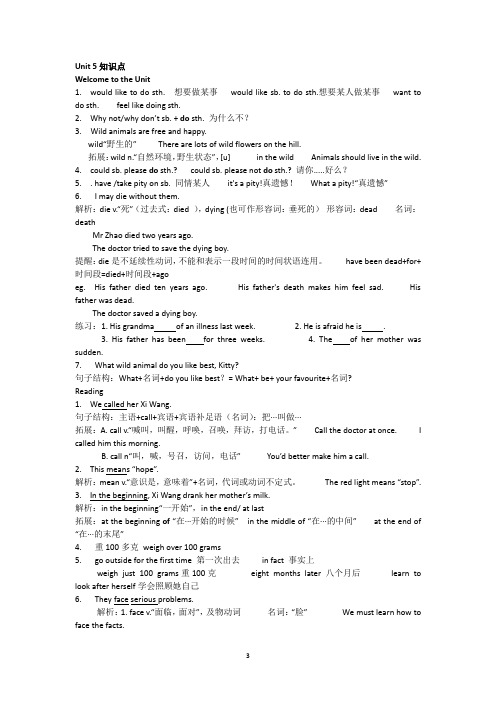
Unit 5知识点Welcome to the Unit1.would like to do sth. 想要做某事would like sb. to do sth.想要某人做某事want to do sth. feel like doing sth.2.Why not/why don’t sb. + do sth. 为什么不?3. Wild animals are free and happy.wild“野生的” There are lots of wild flowers on the hill.拓展:wild n.“自然环境,野生状态”,[u] in the wild Animals should live in the wild.4. could sb. please do sth.? could sb. please not do sth.? 请你.....好么?5. . have /take pity on sb. 同情某人it's a pity!真遗憾!What a pity!“真遗憾”6. I may die without them.解析:die v.“死”(过去式:died ),dying (也可作形容词:垂死的)形容词:dead 名词:deathMr Zhao died two years ago.The doctor tried to save the dying boy.提醒:die是不延续性动词,不能和表示一段时间的时间状语连用。
have been dead+for+时间段=died+时间段+agoeg. His father died ten years ago. His father's death makes him feel sad. His father was dead.The doctor saved a dying boy.练习:1. His grandma of an illness last week. 2. He is afraid he is .3. His father has been for three weeks.4. The of her mother was sudden.7. What wild animal do you like best, Kitty?句子结构:What+名词+do you like best?= What+ be+ your favourite+名词?Reading1.We called her Xi Wang.句子结构:主语+call+宾语+宾语补足语(名词):把···叫做···拓展:A. call v.“喊叫,叫醒,呼唤,召唤,拜访,打电话。
牛津译林版八年级英语上册Unit5词组、短语归纳

1.住在野外live in the wild2.请你(不)要吃他们好吗?Could / Would you please (not) eat them? 3.加入野生动物俱乐部join the Wild Animals Club4.写篇处于危险中的野生动物的报告write a report on wild animals in danger/ wrote5. 自由的be free6. 随时都可能成为桌子上的菜may become dishes on the table any time7.同情他们,怜悯他们have/ take pity on them8. 仅重100克weigh just 100 gramsweigh v. / weighed (过去式)/ weight n.9.减肥lose weight (put on weight)10.在4个月大的时候at four months old11.8个月后eight months later12. 首次开始出去start to go outside h for the first time13. 不再not... any more = no more他不再是孩子了。
He isn’t a baby any more.= He is no more a baby.他不再哭了。
He didn’t cry any more.=He no more cried.14. 看起来像一只小白鼠look like a white mouse (pl. mice) 15.主要以食一种特殊的竹子为生Live mainly on a special kind of bamboo 16.竹林正变得越来越小The bamboo forest is becoming smaller and smaller.越来越大bigger and bigger越来越漂亮more and more beautiful17.开始, 起初in the begi nn ing18.在7月初的时候at the begi nn ing of July19 学习照看她自己learn to look after herself20.不幸的是,大熊猫在野外面临严重的问题Sadly, giant pandas face serious problems in the wild.21.对于熊猫来说,生小(熊猫)是困难的。
牛津译林版八年级英语上册Unit5 重要词组和句型
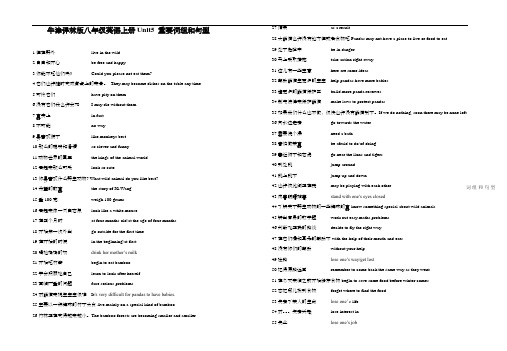
牛津译林版八年级英语上册Unit5 重要词组和句型1住在野外live in the wild2自由和开心be free and happy3你能不吃他们吗?Could you please not eat them?4它们也许随时变成餐桌上的菜肴。
They may become dishes on the table any time.5可怜它们have pity on them6没有它们我也许会死I may die without them.7事实上in fact8不可能no way9最喜欢猴子like monkeys best10那么的聪明和滑稽so clever and funny11动物世界的国王the kings of the animal world12看起来那么可爱look so cute13你最喜欢什么野生动物? What wild animal do you like best?14希望的故事the story of Xi Wang15重100克weigh 100 grams16看起来像一只白老鼠look like a white mouse17在四个月时at four months old/at the age of four months18开始第一次外出go outside for the first time19在开始的时候in the beginning/at first20喝她妈妈的奶drink her mother’s milk21开始吃竹笋begin to eat bamboo22学会照顾她自己learn to look after herself23面临严重的问题face serious problems24对熊猫来说生宝宝很难It’s very difficult for pandas to have babies.25主要以一种特殊的竹子为食live mainly on a special kind of bamboo26竹林正在变得越来越小。
Unit5单词以及语法点梳理牛津译林版八年级英语下册

dying adj. 奄奄一息的death n. 死亡The hero’s death made us very sad. 这个英雄的死亡让我们很难过。
16. explain v. 解释,说明Can you explain why you were late? 你能解释一下你为什么迟到吗?【拓展】explanation n. 解释,解说,说明She told the court she would give a full explanation of the prosecution’s decision on Monday.她告诉法庭她会在星期一对原告方的决定作出全面解释。
17.against prep. 相反,反对e.g. No one is against this proposal.没有人反对这个提议。
That's against the law,那是违法的。
辨析:against 与for两者都可表示方向,下图指明了两者的区别:for against●→ ←○ ←● ○→向着(赞同)逆着(反对)e.g. The Prince is making for the open sea while the princess is against. 王子号向着大海驶去,而公主号恰好驶回。
18. go off突然作响When the fire alarm went off, we all moved to the playground.消防警铃突然作响,我们都逃到了操场上。
【拓展】★go off变质= go badI didn’t put the food in the fridge in time so it went off. 我没有及时把食物放进冰箱以致它变质了。
★go off爆炸The bomb was exploded under controlled conditions. 炸弹在受控条件下被引爆了。
牛津译林版英语八上Unit 5《Wild animals》(Grammar)教学设计

牛津译林版英语八上Unit 5《Wild animals》(Grammar)教学设计一. 教材分析牛津译林版英语八上Unit 5《Wild animals》主要介绍了一些野生动物,包括老虎、狮子、熊、大象等。
本单元主要让学生掌握一般现在时的被动语态和一般过去时的被动语态,以及如何运用这些时态描述野生动物的特点和习性。
此外,本单元还包括一些关于野生动物的保护和濒危问题,旨在提高学生的环保意识。
二. 学情分析学生在学习本单元前,已经掌握了动词的现在时态和过去时态,以及一些基本的野生动物知识。
但部分学生对英语语法的学习仍有一定难度,尤其是对被动语态的运用。
因此,在教学过程中,需要关注学生的个体差异,针对不同学生的学习需求进行引导和帮助。
三. 教学目标1.能熟练运用一般现在时和一般过去时的被动语态描述野生动物的特点和习性。
2.能听懂、会说、会读、会写与野生动物相关的词汇和句子。
3.提高学生的环保意识,增强对野生动物的保护意识。
4.培养学生的合作能力和观察能力。
四. 教学重难点1.一般现在时和一般过去时的被动语态的运用。
2.野生动物相关词汇的掌握和运用。
3.对文本内容的理解和运用。
五. 教学方法1.任务型教学法:通过设定各种任务,让学生在实践中学习和运用语言。
2.情境教学法:创设各种情境,让学生在真实的环境中学习和运用语言。
3.合作学习法:鼓励学生分组合作,共同完成任务,培养团队精神。
4.观察法:引导学生观察野生动物的特点和习性,提高观察能力。
六. 教学准备1.教材、课件和教学资源。
2.野生动物的图片、视频等素材。
3.练习题和测试题。
4.分组合作的任务单。
七. 教学过程1.导入(5分钟)利用图片、视频等素材,引导学生谈论他们所知道的野生动物,激发学生的学习兴趣。
2.呈现(10分钟)展示教材中的图片和文字,引导学生观察和描述野生动物的特点和习性。
同时,引入一般现在时和一般过去时的被动语态。
3.操练(15分钟)分组进行角色扮演,让学生运用所学的被动语态描述野生动物的特点和习性。
牛津译林版初中英语八年级下册Unit5重点单词、短语、句型、电子书汇总
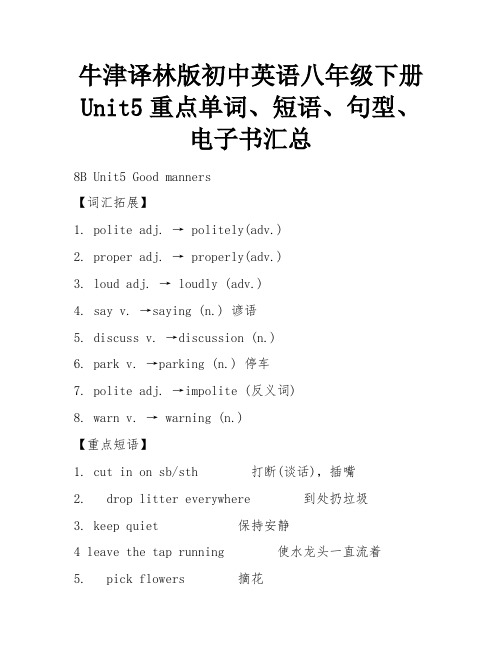
牛津译林版初中英语八年级下册Unit5重点单词、短语、句型、电子书汇总8B Unit5 Good manners【词汇拓展】1. polite adj. → politely(adv.)2. proper adj. → properly(adv.)3. loud adj. → loudly (adv.)4. say v. →saying (n.) 谚语5. discuss v. →discussion (n.)6. park v. →parking (n.) 停车7. polite adj. →impolite (反义词)8. warn v. → warning (n.)【重点短语】1. cut in on sb/sth 打断(谈话),插嘴2. drop litter everywhere 到处扔垃圾3. keep quiet 保持安静4 leave the tap running 使水龙头一直流着5. pick flowers 摘花6. obey traffic rules 遵守交通规则7. invite sb to do sth 邀请某人做某事8. keep the library clean 保持图书馆干净9. the proper way to do sth 做某事的恰当方式10. say hello to sb 向某人问好11. for the first time 第一次12. talk about 谈论13. in public 在公共场合14. laugh loudly 大声地笑15. by accident 偶然地,意外地16. greet each other 互相问候17. any time 任何时候;随时18. on one's own 单独19. join the discussion 加入到讨论中20. express oneself clearly 清楚地表达自己21. write down 写下,记下22. be busy with/doing sth 忙于(做)某事23. warn sb of sth 警告某人某事24. keep sb away from danger 使某人远离危险25. no smoking 禁止吸烟26. soon after 不久以后27. in order to 为了28.make one's dream e true 使某人的梦想成为现实29. practise doing sth 练习做某事30. the purpose of ……的目的31.above all 首要的是32. in one's way挡住某人的路【重点句子】1.霍波,你已经够大了,所以你应该学点礼貌。
牛津译林版八年级英语上册unit5单元知识点归纳
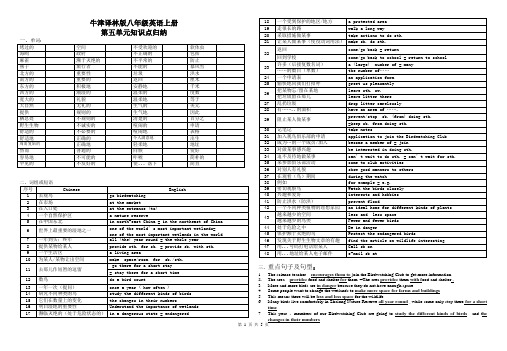
牛津译林版八年级英语上册第五单元知识点归纳三、重点句子及句型:1.The science teacher encourages them to join the Birdwatching Club to get more information.2.The area provide s food and shelter for them..=The area provide s them with f ood and shelter .3.More and more birds are in danger because they do not have enough space.4.Some people want to change the wetlands to make more space for farms and buildings.5.This means there will be less and less space for the wildlife.6.Many birds live comfortably in Zhalong Nature Reserve all year round , while some only stay there for a shorttime.7.This year ,members of our Birdwatching Club are going to study the different kinds of birds and t hechanges in their numbers.8.We hope this information will help them understand and make them actively take actions to protect wildlife.9.We need more people to help us count and do something to help the birds .10.Studying Zhalong helps us learn about protecting wildlife.11.The sun shone brightly as we got on the school bus .12.He also told us to walk softly and not to frighten the birds .13.It has an area of more than 210,000 hectares. = It is over 210,000 hectares in area.14.Zhalong is the home of a lot of plants and animals, including different kinds of birds.15.I think it is important for me to do something to protect birds.16.It is important for you to write your reports clearly .17.I will be very happy if I can become a member of your club .18.You can call me on 010-5558 6390 or e-mail me at********************.cn.19.They simply can’t wait for the party next week.1.科学老师们鼓励他们加入鸡鸟俱乐部来了解更多关于鸟的信息中心2.这个地区为他们提供食物和栖息地。
牛津译林版英语八下Unit5单词、短语、句子及答案

8BUnit5单词、短语、句子及答案一、单词1. n[复]礼貌,礼仪,规矩____________2.excl嗯,什么,啊____________3.打断(说话),插嘴____________4.adv礼貌地____________5.n垃圾,杂物____________6.n水龙头,旋塞____________7.vi流动____________8vi.采摘____________9.vt&vi遵守,顺从____________10.vi(人,车等)排队等候__________11.n轮流,(轮流)顺序____________12.adj符合习俗的,正确的__________13.vt问候,打招呼____________14.与某人握手____________15.n亲吻____________16.adj亲密的,严密的____________17.n(非正式)交谈,谈话____________18.vt避免____________9.n话题,主题____________20.vt&vi表现____________21.n民众,群体____________22.公开地;在别人面前____________23.vt&vi推,挤____________24.插队,加塞____________25.vt&vi撞,碰____________26.挡住某人的路____________27.vt触摸,碰____________28.vt原谅,宽恕____________29.劳驾____________30.conj到…时,直到…为止_________31.也,还有____________ 32.adv大声地____________33.conj正如,如同____________34.n谚语,格言____________35. n罗马人____________36.偶然,意外地____________37.n讨论____________38.vt表达____________39.adj公共的,公开的____________40.vt&vi解释____________41.保护,使免受____________42vt&vi.警告,告诫____________43.n.停车____________44.vt&vi乱丢杂物____________45.adj成功的____________46.adv在某时____________47.不久以后____________48.vt冒险做____________49.n软体虫,蠕虫____________50.n痛,疼痛____________51.n收获____________52.adv真正地____________53.n练习,训练,实践____________54.n蜡烛____________55.n目的____________56.n内容,目录____________57.n总结,归纳____________58n.客人,宾客____________59.n主人,主持____________60. 首要的是____________61.adj不礼貌的____________Unit 5词组1. cut in (on sb/sth) 打断(谈话),插嘴2. drop litter everywhere 到处乱扔垃圾3. leave the tap running 把水龙头一直开着4. keep quiet in the library 在图书馆里保持安静5. pick flowers in the park 在公园里摘花6. obey traffic rules 遵守交通规则7. queue for one’s turn 排队等候8. invite sb to do sth 邀请某人做某事9. the proper way to greet people正确的问候他人的方式10. shake one’s hand = shake hands with sb 与某人握手11. greet people with a kiss 以亲吻方式问候人们12. close friends 亲密的朋友13. start a conversation 开始谈话14. something else 其他的事情15. avoid subjects like 避免像……的话题16. avoid doing sth 避免做某事17. behave politely 表现得有礼貌18. in public 公开地19. push in before others 在别人前面插队20. in one’s way 挡住某人的路21. push past sb 从某人身边挤过去22. as well 也23. excuse me 劳驾24. all the time 一直25 . keep your voice down 压低声音26. shout or laugh loudly 大叫或大笑27. in Rome 在罗马28. try not to do something 尽量不要做某事29. by accident 偶然;意外地30. say hello to someone 向某人问好31. in a strange place 在一个陌生的地方32. improve our manners 改善我们的礼仪33. join the discussion 参加讨论34. express oneself clearly 清楚地表达自己的观点35. write down all the main points 写下所有的要点36. be busy with her dancing lessons 忙于她的舞蹈课37. public signs 公共标志38. be used in public places 被用在公共场所39. explain sth to sb 向某人解释某事40. give us useful information给我们有用的信息41. keep us safe from danger 使我们安全脱离危险42. in places like hospitals 在像医院这样的地方43. No smoking / photos / parking / littering禁止吸烟/拍照/停车/乱扔杂物44. this famous painting by Picasso这幅毕加索的名画45. I didn’t notice that sign just now.我刚才没有注意那个标志。
牛津译林版英语8A Unit 5 重点短语和句子

牛津课本八年级 U5 重点知识归纳一、词组或短语1. 生活在野外2. 不可能 l ive in the wi ld no way3. 同情穷人 have / t ake p i ty on poor peop lein fac t4. 实际上,事实上5. 动物世界之王6. 称他为圣诞老人7.看起来像只白老鼠8.重 100 克 the k ings o f the an i mal wor ldca l l h im Fa ther Chr i s tmaslook l ike a whi te mouseweigh 100 g rams9.开始第一次走出她的家门 10.不再… s ta r t to go ou t s ide her home for the f i r s t t imenot… any more11.一开始 in the beg inn ing12.面对严重的问题 face se r ious p rob lems13.主要以吃一种特殊的竹子为生 live main ly on a spec ia l k ind o f bamboo14.因此 as a resu l t15.有住的地方 have a p lace to l ive(be) in danger16.处在危险之中 17.采取措施干某事 18.立刻,马上 t ake ac t ion to do s t hr igh t away=a t oncebui ld more panda r eservesmake l aws to p ro tec t pandasl ea rn to look a f t e r herse l fcome in to the wor l d as a babyge t s i ck19.建造更多的熊猫保护区 20.制定法律保护熊猫 21.学会照顾她自己 22.出生/ 出世 23.生病 24.出生时,诞生时 25.半年 a t b i r thha l f a year26.害怕做某事 be a f ra id o f do ing s ths leep with one’s eyes closedget lost=lose one’s waywork ou t a maths prob lemwork i t /them ou t27.闭着眼睛睡觉 28.迷路 29.解答一道数学题 30.解决它/它们 31.在老师的帮助下 32.与…同样 with the he lp o f the t eacherthe same ---as33.一会儿 fo r a shor t whi le34.捉老虎取它们的皮毛和骨头 35.身体的其它部分 36.以团队形式一起工作 37.对人有危险 ca tch t ige r s fo r thei r fu r and bonesother pa r t s o f the bodywork as a t eambe dangerous to humansfewer and fewer l i ving a reaski l l fo r fun38.越来越少的生存区域 39.为取乐而杀害 40.失去生命 lose one’s life=dieneed our p ro tec t ion41.需要我们的保护42.有快乐和悲伤的感觉 43.谢谢你的好意 have fee l ings o f happiness and sadnessthank you fo r your kindnessaccep t our inv i ta t ion44.接受我们的邀请 45.一份有关处于危险中的动物的报告 a repor t on an an i mal in dangerm ove a round s lowlyin the day t imes leep th rough the winte r46.四周慢慢地走走 47.在白天 48.整个冬天睡觉 二、重点句子及句型:1. 你愿意生活在野外吗?W ould you l ike to l ive in the wi ld?2.你最喜欢什么野生动物?(2 种)W hat wi ld an imal do you l ike bes t? = What i s your favor i t e wi ld an imal?3. 当“希望”出生时,她只有 100 克。
八年级英语下册:Unit 5 International charities语法解析(译林牛津版)
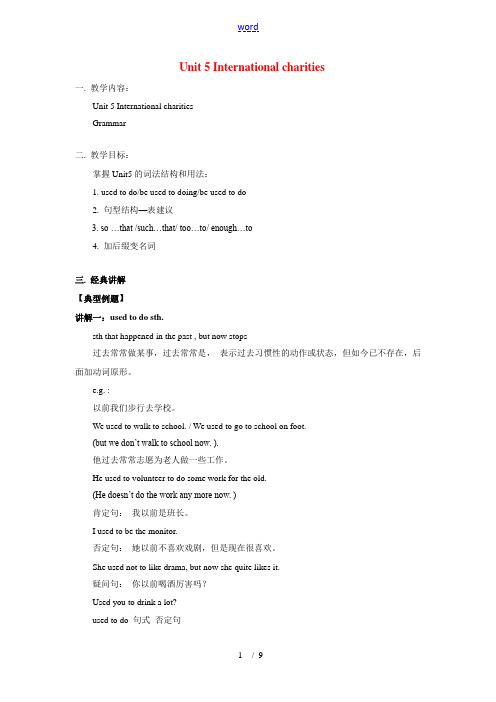
Unit 5 International charities一. 教学内容:Unit 5 International charitiesGrammar二. 教学目标:掌握Unit5的词法结构和用法:1. used to do/be used to doing/be used to do2. 句型结构—表建议3. so …that /such…that/ too…to/ enough…to4. 加后缀变名词三. 经典讲解【典型例题】讲解一:used to do sth.sth that happened in the past , but now stops过去常常做某事,过去常常是,表示过去习惯性的动作或状态,但如今已不存在,后面加动词原形。
e.g. :以前我们步行去学校。
We used to walk to school. / We used to go to school on foot.(but we don’t walk to school now. ).他过去常常志愿为老人做一些工作。
He used to volunteer to do some work for the old.(He doesn’t do the work any more now. )肯定句:我以前是班长。
I used to be the monitor.否定句:她以前不喜欢戏剧,但是现在很喜欢。
She used not to like drama, but now she quite likes it.疑问句:你以前喝酒厉害吗?Used you to drink a lot?used to do 句式否定句used not to dodidn’t use to do一般疑问句Used…to do …? Yes,…used. /No,…usedn’t.Did …use to do? Yes,…did. /No,…didn’t.他们以前不抽烟。
牛津译林版英语八年级英语上册 Unit5知识点梳理

Unit 5知识点Welcome to the Unit1.would like to do sth. 想要做某事would like sb. to do sth.想要某人做某事want to do sth. feel like doing sth.2.Why not/why don’t sb. + do sth. 为什么不?3. Wild animals are free and happy.wild“野生的” There are lots of wild flowers on the hill.拓展:wild n.“自然环境,野生状态”,[u] in the wild Animals should live in the wild.4. could sb. please do sth.? could sb. please not do sth.? 请你.....好么?5. . have /take pity on sb. 同情某人it's a pity!真遗憾!What a pity!“真遗憾”6. I may die without them.解析:die v.“死”(过去式:died ),dying (也可作形容词:垂死的)形容词:dead 名词:deathMr Zhao died two years ago.The doctor tried to save the dying boy.提醒:die是不延续性动词,不能和表示一段时间的时间状语连用。
have been dead+for+时间段=died+时间段+agoeg. His father died ten years ago. His father's death makes him feel sad. His father was dead.The doctor saved a dying boy.练习:1. His grandma of an illness last week. 2. He is afraid he is .3. His father has been for three weeks.4. The of her mother was sudden.7. What wild animal do you like best, Kitty?句子结构:What+名词+do you like best?= What+ be+ your favourite+名词?Reading1.We called her Xi Wang.句子结构:主语+call+宾语+宾语补足语(名词):把···叫做···拓展:A. call v.“喊叫,叫醒,呼唤,召唤,拜访,打电话。
牛津译林版英语八上Unit5《Wildanimals》(Grammar)说课稿

牛津译林版英语八上Unit 5《Wild animals》(Grammar)说课稿一. 教材分析《牛津译林版英语八上Unit 5 Wild animals》是一篇关于野生动物的阅读文章。
本节课主要围绕野生动物的保护与关爱展开,通过阅读文章使学生了解野生动物的生存现状,提高他们的环保意识。
教材内容丰富,插图生动有趣,激发学生的学习兴趣。
此外,本节课还涉及到一般现在时和一般过去时的用法,为学生提供了一个实践语法知识的机会。
二. 学情分析八年级的学生已经具备了一定的英语基础,能够听、说、读、写简单的英语句子。
但部分学生在阅读理解方面还存在一定的困难,尤其是一些长难句的理解。
此外,学生的环保意识有待提高,通过本节课的学习,希望能够激发他们关爱野生动物、保护环境的意识。
三. 说教学目标1.知识目标:(1)能够理解文章主要内容,掌握一般现在时和一般过去时的用法。
(2)能够运用所学知识描述野生动物的特点和生活习性。
2.能力目标:(1)提高学生的阅读理解能力,能够快速捕捉文章关键信息。
(2)培养学生的口语表达能力,能够用英语讨论野生动物的保护问题。
3.情感目标:提高学生的环保意识,培养他们关爱野生动物、保护环境的情感。
四. 说教学重难点(1)理解文章主要内容,掌握一般现在时和一般过去时的用法。
(2)运用所学知识描述野生动物的特点和生活习性。
(1)理解文章中的一些长难句。
(2)运用一般过去时描述野生动物的生活习性。
五. 说教学方法与手段本节课采用任务型教学法,以学生为主体,教师为指导。
通过提问、讨论、小组合作等形式,激发学生的学习兴趣,提高他们的阅读理解能力和口语表达能力。
同时,利用多媒体教学手段,展示野生动物的图片和视频,丰富教学内容,增强学生的直观感受。
六. 说教学过程1.Pre-reading:(1)展示一些野生动物的图片,引导学生谈论他们喜欢的动物。
(2)询问学生对野生动物的了解,激发他们的阅读兴趣。
2.While-reading:(1)让学生快速阅读文章,回答一些简单的问题,了解文章大意。
牛津译林版八年级英语上册Unit5知识点归纳

牛津译林版八年级英语上册Unit5知识点归纳核心知识归纳副词: sadly 令人遗憾地,不幸地, 伤心地slowly 缓慢地otherwise 要不然连词: while 当......的时候; 和......同时一. 重点短语1.wild animals 野生动物2.any time 任何时候3.at any moment 在任何时候4.no way 不可能,不行5.have/take pity on 同情,怜悯6.in fact 事实上,实际上7.giant panda 大熊猫8.baby panda 小熊猫9.be born 出生10.grow into 长成11.at the beginning 起初12.on one’s own 单独,独自13.face serious problems 面临严峻的问题14.cause problems 引起麻烦15.be absent from school 旷课16.lose one’s life 失去生命17.keep doing sth 继续做某事18.cut down 砍到,削减19.as a result 因此20.be in danger 处于危险中,处境危险21.take action to do 采取行动做某事22.right away 立刻,马上23.make laws 制订法律24.live on 以......为生,将......作为食物25.at birth 出生时,诞生时26.the same as 与......同样27.get lost 迷路28.living areas 生活区域29.work as a team 团队工作30.be in danger 在危险中31.in the daytime 在白天二. 重点句型1. We called her Xi Wang. 我们叫她”希望”. (call sb+ 宾语补足语)2. When Xi Wang was born,she weighed just 100 grams. “希望”刚出生时,体重仅有100 克.( be born)3. Eight months later, she was not a small baby any more. ( not ...any more) 8 个月之后,她不再是一个小幼崽.4. Giant pandas live mainly on a special kind of bamboo. (live on) 大熊猫主要以一种特殊的竹子为食.5. As a result, pandas may not have a palce to live or food to eat. (as a result; a place to live) 结果,大熊猫可能无处生存,也无食可吃.三. 重点语法1. 使用不定式作及物动词的宾语.We decided to start off tomorrow. 我决定明天出发.He began to learn English at the age of 7. 他是从7 岁时开始学英语的.2. 使用”may” 和”might”表明事物可能真实.We may meet lots of problems in our daily life. 在日常生活中我们可能会遇到许多问题.The story might be true. 这个故事可能是真的.中考对接一. 根据英文释义,写出合适的单词1. The (make something happen) of the fire was carelessness.2. Have you enough (room) to work in?3. The time has come for (act)4. He made a (bad or dangerous) mistake.5. It’s difficult for giant pandas to (live on after a difficult or dangerous time ) in the wild.二. 根据所给词的适当形式填空1. Shi Yuqi, a badminton (play) from Jiangsu ,helped China win the 2018 Thomas Cup.2. Thanks for all the (member) hard work! More and more people have learned how to keep kids from danger now.3. ---How much should I pay? ---18 yuan in all, (include) the pen you picked out just now.4. Time is limited. You’d better make a (decide) right now.参考答案cause space action serious surviveplayer member’s including decision。
Unit 5 全单元必背单词短语句型 2022-2023学年牛津译林版英语八年级下册
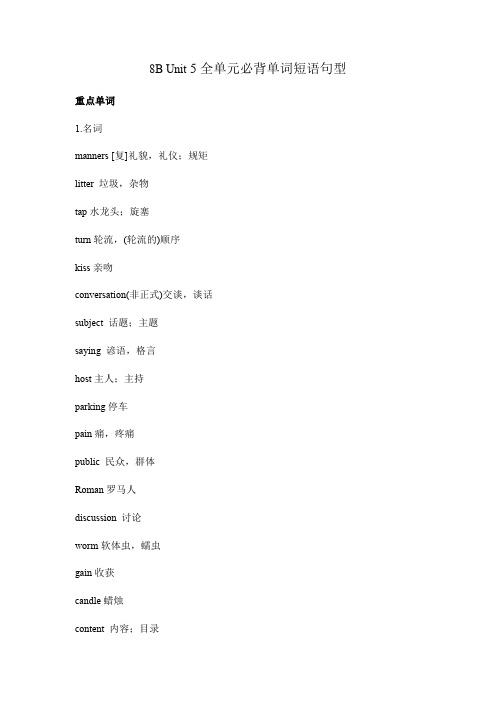
8B Unit 5全单元必背单词短语句型重点单词1.名词manners [复]礼貌,礼仪;规矩litter 垃圾,杂物tap水龙头;旋塞turn轮流,(轮流的)顺序kiss亲吻conversation(非正式)交谈,谈话subject 话题;主题saying 谚语,格言host主人;主持parking停车pain痛,疼痛public 民众,群体Roman罗马人discussion 讨论worm软体虫,蠕虫gain收获candle蜡烛content 内容;目录guest客人,宾客practice 练习;训练;实践purpose 目的conclusion总结,归纳2.动词run vt.流动pick vt.采,摘obey vt.&.vi.遵守,顺从greet vt.问候,打招呼behave vi.&.vt.表现avoid vt.避免touch vt.触摸,碰express vt.表达push vi.&.vt.推,挤excuse vt.原谅,宽恕explain vt.&.vi.解释litter vi.&.vt.乱丢杂物bump vi.&.vt.撞,碰warn vt.&.vi.警告,告诫risk vt.冒险做3.形容词proper 符合习俗的;正确的close亲密的;严密的impolite不礼貌的successful成功的4.连词till到……时,直到……为止as 正如,如同5.副词loudly大声地politely礼貌地sometime(=some time)在某时indeed 真正地6.感叹词eh嗯,什么,啊重点短语in one's way 挡住某人的路drop litter扔垃圾keep quiet保持安静put sth back将……放回(原处)obey traffic rules 遵守交通规则queue for one's turn 排队等候as well(as)也,还有bump into碰撞(某人)behave politely 举止礼貌keep one's voice down 低声说话all the time 始终,一直as the saying goes 俗话说be helpful to sb对某人有帮助cut in(on sb/sth)打断(谈话),插嘴shake sb's hand与某人握手in public公开地,在别人面前push in〈英〉插队,加塞=〈美〉cut in take the photo of 拍……的照片just now刚才重点句型1. You're old enough to learn about manners now, Hobo.霍波,你现在年龄够大了,可以了解礼仪了。
牛津译林版八年级英语下册Unit 5 知识点总结梳理
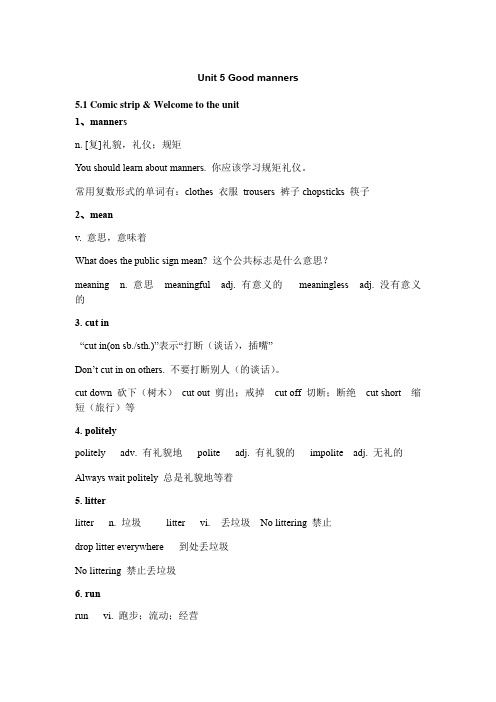
Unit 5 Good manners5.1 Comic strip & Welcome to the unit1、mannersn. [复]礼貌,礼仪;规矩You should learn about manners. 你应该学习规矩礼仪。
常用复数形式的单词有:clothes 衣服trousers 裤子chopsticks 筷子2、meanv. 意思,意味着What does the public sign mean? 这个公共标志是什么意思?meaning n. 意思meaningful adj. 有意义的meaningless adj. 没有意义的3. cut in“cut in(on sb./sth.)”表示“打断(谈话),插嘴”Don’t cut in on others. 不要打断别人(的谈话)。
cut down 砍下(树木)cut out 剪出;戒掉cut off 切断;断绝cut short 缩短(旅行)等4. politelypolitely adv. 有礼貌地polite adj. 有礼貌的impolite adj. 无礼的Always wait politely 总是礼貌地等着5. litterlitter n. 垃圾litter vi. 丢垃圾No littering 禁止drop litter everywhere 到处丢垃圾No littering 禁止丢垃圾6. runrun vi. 跑步;流动;经营Running regularly is good for our health.Run a company. 经营一家公司。
Don’t keep the water running all the time. 不要让谁一直放着。
5.2 Reading1. What’s the proper way to greet people there, Jenny?proper adj. 符合习俗的;正确的She is always proper in her behavior. 她的行为总是符合习俗。
牛津译林版英语八年级英语上册 Unit5知识点梳理
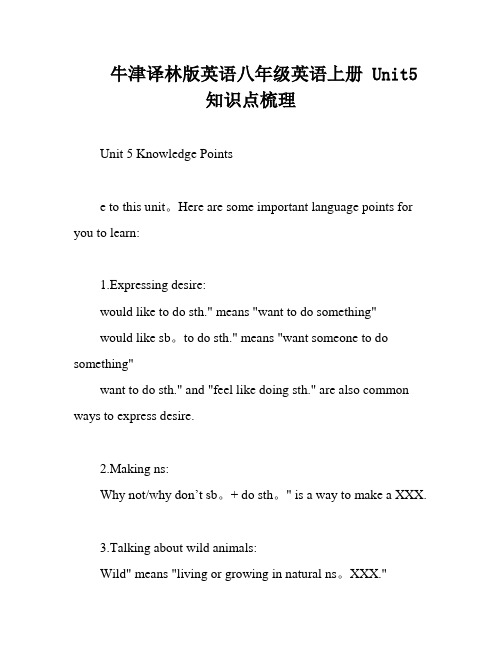
牛津译林版英语八年级英语上册 Unit5知识点梳理Unit 5 Knowledge Pointse to this unit。
Here are some important language points for you to learn:1.Expressing desire:would like to do sth." means "want to do something"would like sb。
to do sth." means "want someone to do something"want to do sth." and "feel like doing sth." are also common ways to express desire.2.Making ns:Why not/why don’t sb。
+ do sth。
" is a way to make a XXX.3.Talking about wild animals:Wild" means "living or growing in natural ns。
XXX."For example。
"wild flowers" XXX。
not in a garden.We can also use "wild" as a noun to talk about the natural environment or the state of being wild.4.Asking for a favor:Could sb。
please do sth。
" is a polite way to ask for a favor.Could sb。
please not do sth。
Unit5知识点讲解牛津译林版英语八年级上册

八上第五单元知识点讲解1.知识目标:学生能够掌握第五单元的短语和词汇。
2.技能目标:学生能够掌握情态动词may的用法。
3.情感目标:学生能够养成保护野生动物的意识。
1.情态动词may的用法。
ic&Wele to the unit知识点1.Would you like to live in the wild,Eddie?你想住在野外吗?【用法详解】(1)wild表示“自然环境,野生状态”in the wild表示“在野外”。
(2)wild还可以表示“野生的” 例如:wild animals。
Eg.1.Can the baby pandas live in the wild on their own?熊猫宝宝能够独自在野外生存吗?2.In those days we often went to dig for wild vegetables.那时候我们常常出去挖野菜。
【典例讲解】1.If animals stay in the ____ (野外),they will be free.2.I don't think the animals should be kept in the zoo,but if they live in the _______, we have no chance to see them.3.它们在野外露营。
(翻译为英文)_______________________________________________________________________________ ____知识点2.So could you please not eat them?因此请你不要吃它们好吗?【用法详解】Can/Could you please.?此句型用来表示请求别人做某事,意思是“请你……,好吗?”。
could 是can的过去式,但在本句型中并不表示时间上的区别,而只是语气上的不同。
Unit+5+知识点 牛津译林版八年级英语上册

译林版八年级上册Unit 5英语知识点Part 1 重点单词1、Free(1)自由的,不受束缚的feel free to do sth.随意做某事,名词freedom自由(2)免费的be free for 对... 免费;for free 免费的give sth. To sb. for free 免费把某物给某人(3)空闲的;I am free tomorrow. 我明天有空。
反义词busy2、have/take pity on sb /sth意为“同情/怜悯某人/某物”Don't take pity on evil people! 不要怜惜恶人!3、die(动词)死(1)dead(形容词),死的,去世的,the dead 死者(2)death(名词)死亡(3)dying可作形容词,意为“临终的;垂死的”,常在名词前作定语That is a dying man. 那是一个垂死之人。
(4)dying to do sth. 渴望做某事; 迫切做某事;I’m dying to have my own house.我渴望有自己的房子。
4、英语中几个常见的连系动词,后加形容词1) be动词,如i am fine2) 感官动词:look,sound,feel,taste,smell,如feel good3) 表变化:get,grow,turn,become ,如get well (这里的well是形容词,表身体好)4) 保持:keep,stay,remain 如keep fit5)seem 如seem sad系动词:一般用一般现在时,没有现在进行时(除了feel,i am feeling good)5、mean(动词),意思是,意味着What does…mean ?=What’s the meaning of... ……是什么意思?mean to do sth. 打算做某事I mean to go the supermarket.我打算去超市。
江苏专版牛津译林八年级下册Unit 5 知识点复习总结
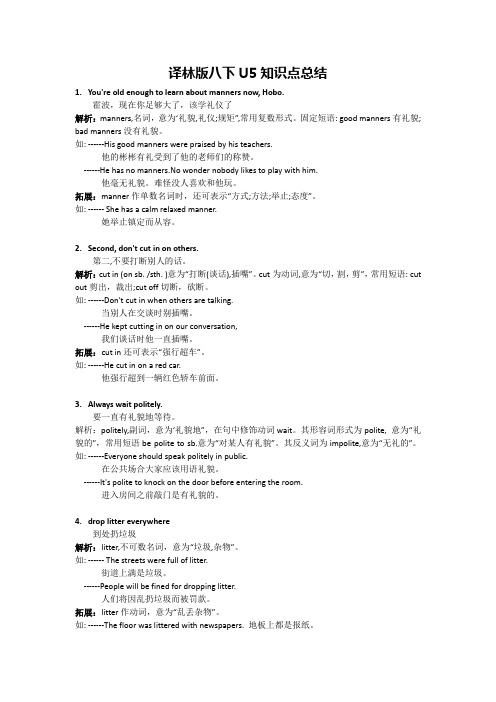
译林版八下U5知识点总结1.You're old enough to learn about manners now, Hobo.霍波,现在你足够大了,该学礼仪了解析:manners,名词,意为‘礼貌,礼仪;规矩”,常用复数形式。
固定短语: good manners有礼貌; bad manners没有礼貌。
如: ------His good manners were praised by his teachers.他的彬彬有礼受到了他的老师们的称赞。
------He has no manners.No wonder nobody likes to play with him.他毫无礼貌。
难怪没人喜欢和他玩。
拓展:manner作单数名词时,还可表示“方式;方法;举止;态度”。
如: ------ She has a calm relaxed manner.她举止镇定而从容。
2.Second, don't cut in on others.第二,不要打断别人的话。
解析:cut in (on sb. /sth. )意为“打断(谈话),插嘴”。
cut为动词,意为“切,割,剪”,常用短语: cut out剪出,裁出;cut off切断,砍断。
如: ------Don't cut in when others are talking.当别人在交谈时别插嘴。
------He kept cutting in on our conversation,我们谈话时他一直插嘴。
拓展:cut in还可表示“强行超车”。
如: ------He cut in on a red car.他强行超到一辆红色轿车前面。
3.Always wait politely.要一直有礼貌地等待。
解析:politely,副词,意为‘礼貌地”,在句中修饰动词wait。
其形容词形式为polite, 意为“礼貌的”,常用短语be polite to sb.意为“对某人有礼貌”。
- 1、下载文档前请自行甄别文档内容的完整性,平台不提供额外的编辑、内容补充、找答案等附加服务。
- 2、"仅部分预览"的文档,不可在线预览部分如存在完整性等问题,可反馈申请退款(可完整预览的文档不适用该条件!)。
- 3、如文档侵犯您的权益,请联系客服反馈,我们会尽快为您处理(人工客服工作时间:9:00-18:30)。
9. She thought herself a good birdwatcher .
S V O OC宾补
注意:1.宾语和宾补是主谓关系。
2.常带宾补的动词有make / keep / find / call / believe /think等。
e.g. The news made him unhappy .
We should keep our classroom clean and tidy .
I find him kind .
10.The reserve gives wildlife an ideal home .
S V IO(间宾) DO(直宾)
注意:在英语中常跟双宾语的动词有:
1.give / show/ send / pass/teach/bring sb sth
= give / show / send/pass/teach/bring sth to sb
2.buy/make/sing/draw/get sb sth
= buy/make/sing/draw/get sth for sb
little …‟几乎没有‟‟与不可数名词连用.
few “几乎没有”与可数名词连用.
one of + 可数名词复数形式
形容词变成副词的变化规则:
①一部分形容词同时也是副词:
e. g. long, early, fast
②部分形容词和副词是两个完全不同的词:
e.g. good--- well
③一部分形容词本身就是以“l y”结尾,则不能再在词尾+“ly”,这时可用介词短语的形式来表示方式。
e.g. friendly, lively, lovely, lonely, likely
④一些形容词不能变成方式副词:
1.表语形容词:afraid, alive, alone, asleep
2..表语, 定语形容词:difficult, fat, little, long
⑤以辅音字母+“y”结尾的副词, 要先变“y”为“i”再+“ly”:
⑥以“le”结尾的直接去“e”+“y”即可。
terrible ---terribly, gentle---gently (im) possible--- (im) possibly,
comfortable--- comfortably, simple---- simply
true -truly good - well
hard-hard high-high far-far fast-fast early-early late-late long-long straight-straight easy-easily happy-happily
1. The area provides food and shelter for wildlife.
provide v. 提供
provide sb with sth= provide sth for sb
Sheep provide us with wool.
Sheep provide wool for us.
羊供给我们羊毛。
They provide us with food.
They provide food for us.
他们供给我们食物。
Many birds live comfortably in Zhalong Nature Reserve all year round.
all year round 一年到头,全年
The farmers work on the farm all year round.
农民们长年累月在地里干活。
Pines are green all year round.
松树四季常青。
This means there will be less and less space for wildlife
less and less 越来越少的
比较级+and +比较级表示“越来越……”
The weather is getting colder and colder.
天气越来越冷了。
The air pollution is becoming worse and worse.
空气污染变得越来越严重了。
4. The Chinese government wants to protect these
endangered birds.
protect v. 保护
You should protect yourself.
你应该保护你自己。
We must protect the earth.
我们必须保护地球。
endangered adj.
濒临灭绝的,(生命)有危险的
We should try our best to save endangered animals.
我们应该尽力挽救濒临灭绝的动物。
5. We hope this information will help them understand and make them actively take action to protect wildlife
take action 采取行动
I knew I needed to take action.
我知道我应该采取行动。
What action are we going to take?
我们准备采取什么行动?
我们用一般现在时表示现在经常反复发生的动作、存在的状态或习惯性的动作。
在讨论节目表、时刻表、日程表等内容时,我们也可以用一般现在时描述将来的计划。
The train leaves at six tomorrow
The study begins next month.
Our plane leaves at ten o‟clock tonight.
My cousin finishes school next year.
I hope they have a nice time next week.
用现在进行时表示将来
当句子涉及确切的计划、明确的意图和为将来安排好的活动时,现在进行时可用于表示将来。
1) come, go, stay, arrive, leave 等词的
现在进行时经常用于表示将来确切的计划。
2) 表示交通方式、行程安排的动词,例如 fly,walk, ride, drive, take(a bus, a taxi)等的现在进行时也经常用于表示将来。
注意!
另外,表示将来的动作或状态,还可用以下几种形式:
① will / shall+动词原形
I shall be seventeen years old next month.
② be going to+动词原形:表示即将发生
的或最近打算进行的事。
We are going to have a meeting today.
③be to+动词原形:表示按计划要发生的事或征求对方意见。
Are we to go on with this work?
④be about to+动词原形,表示即将发生的动作,不与表示将来的时间状语连用。
I was about to go swimming when my guide shouted at me and told me not to do so.
我正要去游泳,这时向导大声叫我不要去。
⑤ be +动词的ing形式:表示按计划或安排要发生的事, 含义是“预定要……” 这一结构常用趋向动词 go, arrive, come , leave, start, stay , return 和 play , do , have , work, wear, spend , see, meet等。
--- When are you going off for your holiday?
你什么时候动身去度假?
--- My plane is taking off at 9:20, so I must be at the airport by 8:30.
我乘坐的飞机将于9:20分起飞, 所以我必须在8:30之前赶到机场.
⑥一般现在时表示将来时
(1)按规定预计要发生的未来动作,仅限于动词come, go, leave, move, start, return, arrive, begin, stay等动词.
The plane takes off at 10:10. That is , it’s leaving in ten minutes.
(2)用在状语从句中用一般现在时代替将来时
If you do that again, I’ll hit you.
(3)用在I bet 和I hope后面, 常用一般现在时表将来.
I bet you don’t get up before ten tomorrow.
我敢说你明天不到10点是不会起床的.
⑦单纯叙述未来的事实,可以用将来进行时,也可表示按计划安排将来要执行的动作。
